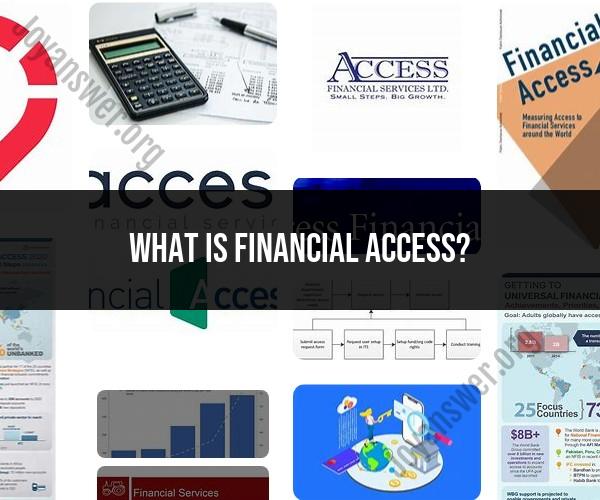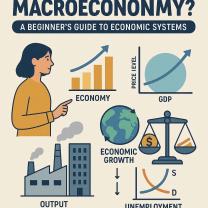What is financial access?
Financial access refers to the ability of individuals, households, and businesses to access and use financial services and products that are essential for managing their financial lives effectively. These services and products are typically provided by financial institutions such as banks, credit unions, microfinance institutions, and fintech companies. Financial access is a crucial aspect of economic development and financial inclusion. Here are some key components and significance of financial access:
Components of Financial Access:
Banking Services: Access to basic banking services like savings accounts, checking accounts, and payment services (e.g., debit cards and online banking).
Credit and Loans: Availability of credit and loans, including personal loans, business loans, and mortgages, to meet various financial needs.
Insurance: Access to insurance products such as life insurance, health insurance, property insurance, and crop insurance to mitigate financial risks.
Investment and Savings: Opportunities to invest in financial assets like stocks, bonds, mutual funds, and access to savings and investment accounts.
Payment and Remittance Services: Access to secure and affordable payment systems and remittance services for transferring money locally and internationally.
Significance of Financial Access:
Poverty Reduction: Financial access can help individuals and families escape poverty by providing tools for savings, access to credit for income-generating activities, and insurance against unexpected financial setbacks.
Economic Growth: Access to financial services promotes economic growth by enabling businesses to invest, expand, and create jobs. It also facilitates entrepreneurship and innovation.
Financial Stability: Widespread access to banking services and insurance contributes to financial stability by reducing the vulnerability of individuals and businesses to financial shocks and crises.
Education and Healthcare: Financial access can improve access to education and healthcare by providing funds for school fees, medical expenses, and health insurance.
Gender Equality: It can empower women by giving them control over their finances, access to credit, and opportunities to start and grow businesses.
Rural Development: In rural areas, access to microfinance and agricultural credit can boost agricultural productivity and rural development.
Digital Financial Inclusion: With the rise of fintech and mobile banking, digital financial access has become increasingly important, allowing people to access financial services through their smartphones and computers.
Financial Inclusion: Financial access is a core element of financial inclusion, which aims to ensure that all segments of the population, including low-income and marginalized groups, have access to affordable and appropriate financial services.
Efforts to promote financial access often involve government policies, regulatory frameworks, financial literacy programs, and the development of financial infrastructure, including banking networks and digital payment systems. Financial institutions and fintech companies also play a crucial role in expanding access to financial services to underserved and remote areas, contributing to economic development and improved quality of life for individuals and communities.
Financial Access: Breaking Down the Concept and Its Significance
Financial access is the ability of individuals and businesses to obtain financial products and services that meet their needs. This includes basic services such as savings accounts, credit, and insurance, as well as more sophisticated products and services such as investment products and financial advice.
Financial access is important because it can help individuals and businesses to achieve their financial goals. For example, access to savings accounts can help people to save for emergencies or unexpected expenses. Access to credit can help people to invest in their education or start a business. And access to insurance can help people to protect themselves against financial losses.
Empowering Communities: The Role of Financial Access in Development
Financial access plays a vital role in development. It can help to reduce poverty, create jobs, and boost economic growth.
For example, when people have access to savings accounts, they are better able to weather financial shocks, such as job loss or illness. This can help to reduce poverty and improve the well-being of families and communities.
Financial access can also help to create jobs. When businesses have access to credit, they can invest in new equipment and hire new employees. This can lead to economic growth and job creation.
Bridging the Gap: Ensuring Financial Inclusion through Access
Financial inclusion is the state in which all members of a society have access to financial products and services that meet their needs. Unfortunately, financial inclusion is not yet a reality for everyone. In many parts of the world, people are still excluded from the financial system.
There are a number of barriers to financial access, including poverty, lack of documentation, and discrimination. These barriers can make it difficult or impossible for people to open a bank account, get a loan, or buy insurance.
There are a number of things that can be done to bridge the gap and ensure financial inclusion for all. These include:
- Expanding the reach of financial institutions: Financial institutions can expand their reach by opening branches in underserved areas and offering mobile banking services.
- Developing innovative financial products and services: Financial institutions can develop innovative products and services that meet the needs of the poor and excluded. For example, microfinance institutions offer small loans to people who would not be able to qualify for a loan from a traditional bank.
- Promoting financial education: Financial education can help people to understand their financial rights and options. It can also help them to make informed financial decisions.
By taking these steps, we can help to ensure that everyone has access to the financial products and services they need to improve their lives and build a better future.













